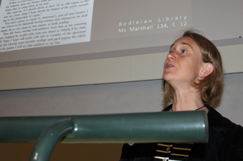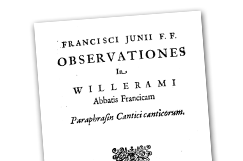Seminar 4: Correspondence According to Francis Junius
Tags: Art, Commentary, Francis Junius, Networks, Seventeenth Century

Dr van Romburgh during her talk.

Junius's 'Observationes' from 1655.
In the fourth paper of our seminar series on Thursday 26 May, Dr Sophie van Romburgh (University of Leiden) spoke about ‘Reciprocal Bonds Between Words and Friends, or Correspondence According to Francis Junius’. In a poetic and suggestive analysis, van Romburgh outlined a new framework for appreciating the correspondence of the seventeenth-century philologist, which she edited in 2002, by turning to the closely related genre of commentary (the etymological elucidations of words and concepts in early modern source texts). Van Romburgh argued for a comparable set of ‘discursive dynamics’ between commentary and learned correspondence, and suggested that both attempted to add ‘lustre’ to objective, impersonal, abstract knowledge by embedding it within lived experience and wider networks of words, scholars, and friends. Not only does the thematic eclecticism and ‘easy mix’ of classical, biblical, and contemporary voices evident in Junius’s commentaries evoke the lively, promiscuous character of intellectual correspondence, but they also combine serious etymological pursuit with personal anecdote (especially evident in his ‘Observationes’ from 1655). This connects the ‘formal grid’ of the dictionary or source text with broader ‘constellations of knowledge and people’, relating the exotic and the arcane to the familiar and the experiential, and providing an example of early modern ‘associative rhetoric’ (Roberta Frank) in action. Junius’s commentaries also reference extra-textual conversations with scholar-friends, as do his letters; a powerful reminder that both commentary and correspondence existed within a voice-oriented culture (or ‘oral story world’), and superimposed a ‘vast, living world of spoken communication, of which only some glimpses make it to paper’. Cultures of Knowledge, argued van Romburgh, are created within this vast multi-dimensional space, and out of the lived practices of networks of scholar-friends (‘the ecology of early modern scholarship’). Questions focussed on national differences in discursive and communicative cultures; the social and political, as well as the discursive and intellectual, logic of early modern annotations; the pedagogical origins of associational thinking; and the very different historiographical trajectories described by the history of science and the history of scholarship. Seminars take place in the Faculty of History on George Street on Thursdays at 3pm. For future talks in the series, please see the seminar webpage.
Podcast now available on the seminar page!


 Join
Join 